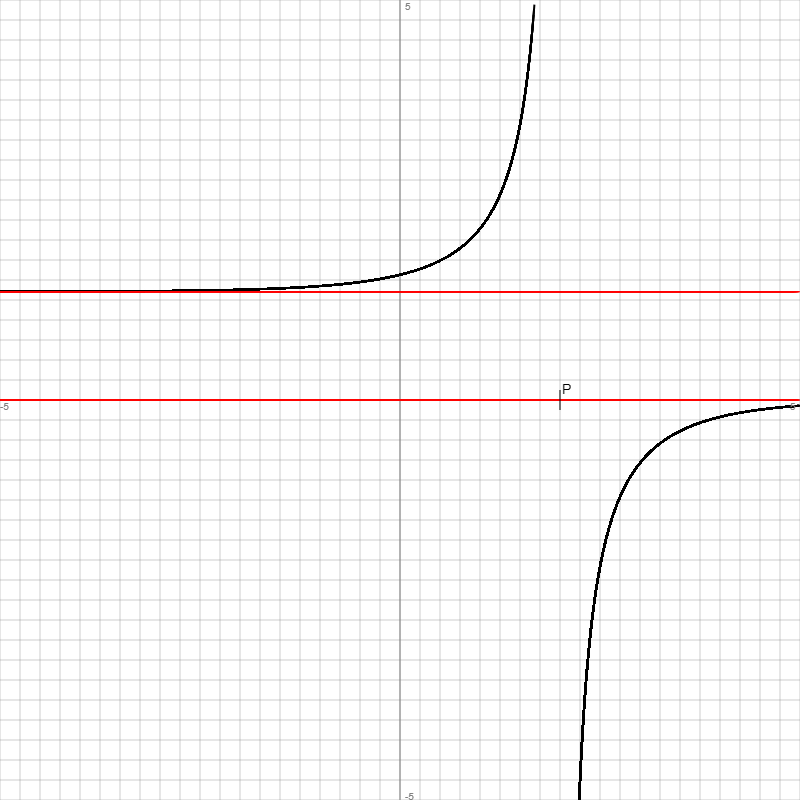
www.michael-buhlmann.de
Funktion: f(x) = -10/(ex-e2), Df = R\{2}, Wf = R, reelle Funktion, x -> -∞: f(x) -> 10/e2 = y als Grenzkurve, x -> +∞: f(x) -> 0 = y als Grenzkurve ->
| Wertetabelle: | |||||
| x | f(x) | f'(x) | f''(x) | f'''(x) | Besondere Kurvenpunkte |
| -5 | 1.3546 | 0 | 0 | 0 | |
| -4.5 | 1.3554 | 0 | 0 | 0 | |
| -4 | 1.3567 | 0 | 0 | 0 | |
| -3.5 | 1.3589 | 0.01 | 0.01 | 0.01 | |
| -3 | 1.3625 | 0.01 | 0.01 | 0.01 | |
| -2.5 | 1.3686 | 0.02 | 0.02 | 0.02 | |
| -2 | 1.3786 | 0.03 | 0.03 | 0.03 | |
| -1.5 | 1.3955 | 0.04 | 0.05 | 0.05 | |
| -1 | 1.4243 | 0.07 | 0.08 | 0.1 | |
| -0.5 | 1.4744 | 0.13 | 0.16 | 0.21 | |
| 0 | 1.5652 | 0.24 | 0.32 | 0.52 | Schnittpunkt Sy(0|1.57) |
| 0.5 | 1.7421 | 0.5 | 0.79 | 1.63 | |
| 1 | 2.141 | 1.25 | 2.7 | 8.3 | |
| 1.5 | 3.4395 | 5.3 | 21.66 | 135.4 | |
| 2 | Infinity | Infinity | Infinity | Infinity | Senkrechte Asymptote/Pol x = 2 mit Vorzeichenwechsel: x -> 2-: f(x) -> +∞, x -> 2+: f(x) -> -∞ |
| 2.5 | -2.0862 | 5.3 | -21.66 | 124.99 | |
| 3 | -0.7876 | 1.25 | -2.7 | 7.97 | |
| 3.5 | -0.3887 | 0.5 | -0.79 | 1.59 | |
| 4 | -0.2118 | 0.24 | -0.32 | 0.51 | |
| 4.5 | -0.121 | 0.13 | -0.16 | 0.21 | |
| 5 | -0.0709 | 0.07 | -0.08 | 0.1 | |
| Graph: | |||||
 | |||||
Graph(en) der Asymptote(n), Grenzkurve(n).
Abkürzungen: Df = (maximaler) Definitionsbereich, f(x) = Funktion, f'(x) = 1. Ableitung, f''(x) = 2. Ableitung, f'''(x) = 3. Ableitung, H = Hochpunkt, L = Lücke, N = Nullstelle, P = Polstelle, R = reelle Zahlen, S = Sprungstelle, T = Tiefpunkt, W = Wendepunkt, WS = Sattelpunkt, Wf = Wertebereich, {.} = ein-/mehrelementige Menge, [.; .] = abgeschlossenes Intervall, (.; .) = offenes Intervall, [.; .), (.; .] = halboffenes Intervall, ∞ = unendlich.
Bearbeiter: Michael Buhlmann